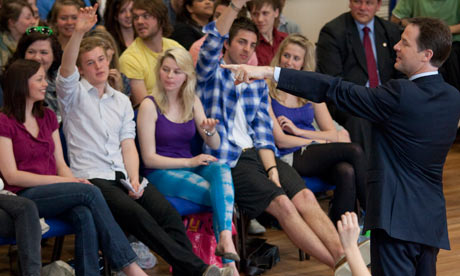
Jill Filipovic: 'People who marry early and/or hold traditional views on marriage and gender tend to have higher divorce rates and unhappier marriages.' Photograph: Corbis
Americans love to tout the value of waiting until marriage to have sex. We teach abstinence-only education in schools across the country, and even comprehensive sex-ed programs often point out that "abstinence is best." Pop stars from Britney Spears to Jessica Simpson, to the Jonas Brothers, to Miley Cyrus, to Justin Bieber routinely assert that they're waiting 'til marriage – putting them into the Good Role Model category (at least, until someone leaks a sex tape). There's a booming "purity industry", complete with jewelry, elaborate events, books, t-shirts and DVDs.
Our state and federal tax dollars have long been spent promoting "chastity". While conservative commentators are happy to assert that waiting until marriage is the best choice for everyone and people who don't wait aren't doing marriage "the right way", sex-positive liberals hesitate to say that having sex before marriage is an equally valid – if not better – choice for nearly everyone.
So here it goes: having sex before marriage is the best choice for nearly everyone.
How do I know? Well, first of all, nearly everyone has sex before marriage – 95% of Americans don't wait until their wedding night. And that's a longstanding American value. Even among folks in my grandparents' generation, nine out of ten of them had sex before they wed.
Of course, just because lots of people do a thing doesn't mean it's a good thing. But sex is. In terms of happiness, sex is better than money, and having sex once a week instead of once a month is the "happiness equivalent" of an extra $50,000 a year. People with active sex lives live longer. Sex releases stress, boosts immunities, helps you sleep and is heart-healthy.
Sex is good whether you're married or not, and certainly folks who wait until marriage can have a lot of sex once they tie the knot. But waiting until marriage often means both early marriage and conservative views on marriage and gender – and people who marry early and/or hold traditional views on marriage and gender tend to have higher divorce rates and unhappier marriages. We know that, on the other hand, there are lots of benefits to marrying later and to gender-egalitarian marriages. Couples who both work outside the home and also share housework duties have more sex. Financially independent, college-educated women who marry later in life have extremely low divorce rates.
It turns out that feminist values – not "traditional" ones – lead to the most stable marriages. And feminist views plus later marriage typically equals premarital sex.
Most adult human beings naturally desire sex. And despite the rightwing emphasis on concepts like "purity", having sex does not actually make you a dirty or "impure" person. On the contrary, sex is like most other pleasurable things in life – you can have sex in ways that are fulfilling, fun, good and generous, or you can have sex in ways that are harmful, bad and dangerous. Marriage is not, and has never been, a way to protect against the harmful, bad and dangerous potential of sex (just read the Bible if you want a few examples). Instead of fooling ourselves into thinking that waiting until marriage makes sex "good", we should focus on how ethical, responsible sexual practices – taking precautions to protect the physical and mental health of yourself and your partner; having sex that is fully consensual and focused on mutual pleasure – are part of being an ethical, responsible human being.
Sexual morality isn't about how long you wait. It's about how you treat yourself and the people you're with.
Sex, of course, isn't all ponies and rainbows. The United States has one of the highest unintended pregnancy rates in the world. We have one of the highest abortion rates. We have one of the highest rates of sexually transmitted infections. But our problem with sex isn't that we're having it before marriage; it's that we've cast it as shameful and dirty. And when our collective cultural consciousness says that sex is shameful and dirty, we don't have the incentive – or the tools– to plan for sex, to see it as a positive responsibility and to make healthy sexual choices.
We're obsessed with sex on television, in music and in advertisements, but we somehow lack the ability to talk about sex as a positive, moral, pleasure-affirming choice that, like any other adult decision, comes with a set of responsibilities. And when government money is going toward telling people to just wait until marriage, we are literally funding an idea that has never worked in all of human history, instead of supporting tried-and-true policies that could mitigate the harm of a sex-obsessed, but pleasure-starved, culture.
If waiting until marriage were simply an individual choice with no political consequences or backdrop – if it were as arbitrary a marker as waiting until the third date, waiting until you knew your partner's middle name or waiting until she wore really awesome high heels – it wouldn't be a problem. And personally, I don't really care when you, as an individual, choose to have sex. As long as you feel ready and it's consensual, I say you do you. But "waiting until marriage" as a cultural phenomenon – albeit one that isn't actually happening for nearly everyone in the western world – has some nasty views about women and sex lurking behind it. Using "purity" as shorthand for "doesn't have sex" by definition means that people, and mostly women, who have sex before marriage are impure, dirty or tainted. As Jessica Valenti says in her book The Purity Myth:
"While boys are taught that the things that make them men – good men – are universally accepted ethical ideals, women are led to believe that our moral compass lies somewhere between our legs."
It's all the more troubling when those beliefs are federally funded.
From a more practical standpoint, not everyone is going to get married, or even legallycan get married. The instruction to wait forever to experience a fundamental human pleasure is pointless and cruel. And while the old adage tells women that men won't buy the cow if they can get the milk for free, if I'm buying a cow, you can bet I'm going to make sure the milk is to my liking. But our cultural view of premarital sex as morally tainted makes it harder for couples to engage in real talks about their sexual needs and desires before marrying, the same way they would talk about their religious values, how many kids they want or whether the wedding cake will be chocolate or vanilla.
Sexually frustrated marriages are both miserable and common – the inboxes of advice columnists from Dan Savage to Dear Prudie are filled with letters from couples with mismatched sex drives and bad sex lives. We'd be a lot better-off if we recognized that sex is incredibly important to a lot of people, and, for most couples, sexual compatibility is necessary for a great marriage. You really can't tell if you're sexually compatible unless you have sex. The insistence that premarital sex is dirty or perverse makes it a whole lot harder to have necessary conversations. And a worldview that positions sex as shameful and bad also isn't going to evaporate on your wedding night.
Purity peddlers construct a false universe where there are pure virgins who wait until marriage, and then there are slutty whores who are going home with different men every night of the week. The truth is that most adults will have a great many importantrelationships in their lives – some of those relationships will be romantic, and some of those will be sexual. That's a good thing: our relationships with other people, sexual or not, are how we grow, evolve and learn about ourselves. They're how we figure out what love is, what we like physically and emotionally, and how to negotiate our own needs with someone else's. Despite the claims of the wait-till-marriage camp, waiting to have sex won't protect you from heartache, frustration or love lost. But a variety of fulfilling relationships, sexual and not, will make you a more well-rounded, compassionate and self-assured person.
My point isn't that everyone should have sex before marriage – people should determine for themselves when they are ready to have sex. For the vast majority of people, that's going to be before they're married. Making that choice isn't a moral failing. On the contrary, it's often a great, healthy, overwhelmingly positive choice. Whenever you choose to have sex, the cultural message that waiting until marriage is the best choice is simply wrong. And it's wrong for almost everyone.








